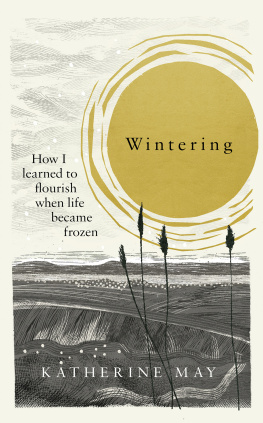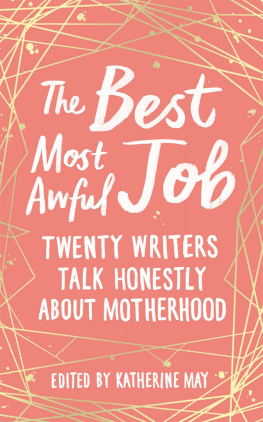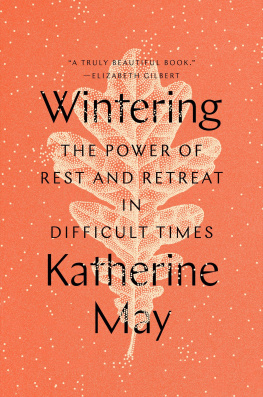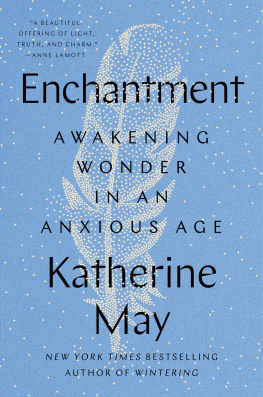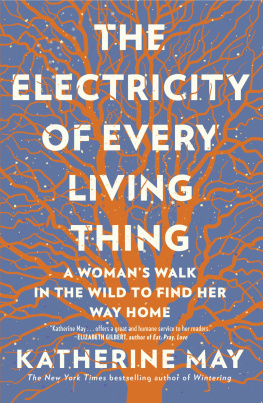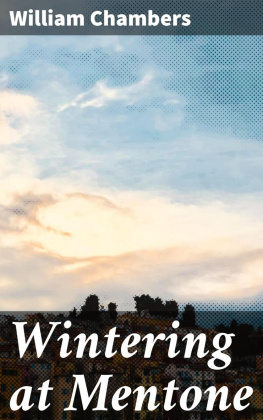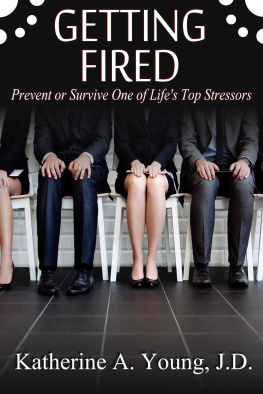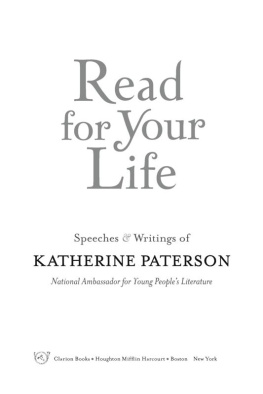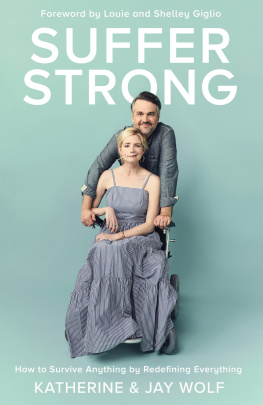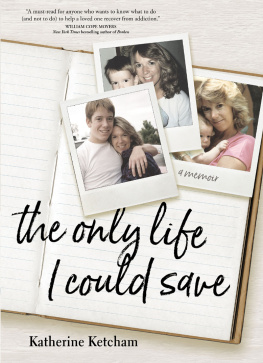Katherine May - Wintering: How to Survive When Life Is Frozen
Here you can read online Katherine May - Wintering: How to Survive When Life Is Frozen full text of the book (entire story) in english for free. Download pdf and epub, get meaning, cover and reviews about this ebook. year: 2020, publisher: Ebury Publishing, genre: Detective and thriller. Description of the work, (preface) as well as reviews are available. Best literature library LitArk.com created for fans of good reading and offers a wide selection of genres:
Romance novel
Science fiction
Adventure
Detective
Science
History
Home and family
Prose
Art
Politics
Computer
Non-fiction
Religion
Business
Children
Humor
Choose a favorite category and find really read worthwhile books. Enjoy immersion in the world of imagination, feel the emotions of the characters or learn something new for yourself, make an fascinating discovery.
- Book:Wintering: How to Survive When Life Is Frozen
- Author:
- Publisher:Ebury Publishing
- Genre:
- Year:2020
- Rating:3 / 5
- Favourites:Add to favourites
- Your mark:
- 60
- 1
- 2
- 3
- 4
- 5
Wintering: How to Survive When Life Is Frozen: summary, description and annotation
We offer to read an annotation, description, summary or preface (depends on what the author of the book "Wintering: How to Survive When Life Is Frozen" wrote himself). If you haven't found the necessary information about the book — write in the comments, we will try to find it.
Wintering: How to Survive When Life Is Frozen — read online for free the complete book (whole text) full work
Below is the text of the book, divided by pages. System saving the place of the last page read, allows you to conveniently read the book "Wintering: How to Survive When Life Is Frozen" online for free, without having to search again every time where you left off. Put a bookmark, and you can go to the page where you finished reading at any time.
Font size:
Interval:
Bookmark:



- PROLOGUE: SEPTEMBER :
INDIAN SUMMER - EPILOGUE: LATE MARCH :
THAW
Katherine May is a writer of both fiction and non-fiction. She lives by the sea in Whitstable and is an avid lover of the outdoors. She lives and breathes everything the natural world has to offer and is compelled by how the wild and extreme landscapes can benefit our mental and emotional wellbeing. She loves sea-swimming and long walks, both of which have helped in overcoming her own wintering experiences. Her life-affirming memoir The Electricity of Every Living Thing is about her walk in the wilds as she came to terms with an Aspergers diagnosis. Her personal wintering experiences have taught her what it means to be different and how we can all learn to make peace within our own unquiet minds.
By the same author
The Electricity of Every Living Thing
Burning Out
Ghosts and Their Uses
A Diary of Slow Progress
For all who have wintered.
Over the land freckled with snow half-thawed
The speculating rooks at their nests cawed
And saw from elm-tops, delicate as flowers of grass,
What we below could not see, Winter pass.
Edward Thomas, Thaw
Some winters happen in the sun. This particular one began on a blazing day in early September, a week before my fortieth birthday.
I was celebrating with friends on Folkestone beach, the start of a fortnight of lunches and drinks that I hoped would avoid a party and see me safely into the next decade of my life. The photographs I have of that day seem absurd now that I know what was about to happen. High on a sense of my own becoming, I snapped the seaside town bathed in the warmth of an Indian summer. The vintage-looking laundrette that we passed on the walk from the car park. The pastel-coloured concrete beach huts that stack along the Leas. Our combined children jumping over the shingle together, and paddling in an impossibly turquoise sea. The tub of gypsy tart ice cream that I ate while they played.
There are no photos of my husband, H. Thats not necessarily unusual: the photos I take, over and over again, are of my son, Bert, and the sea. But what is unusual is the blank in the photographic record from that afternoon until two days later, when there is a picture of H in a hospital bed, trying to force a smile for the camera.
By the time I was taking those idyllic seaside pictures, H was already complaining that he felt sick. It didnt signify much; I have found that parenting a child at infant school brings one long succession of germs into the house, which cause sore throats and rashes and blocked noses and stomach aches. He wasnt even making a fuss. But after a lunch that he couldnt bear to eat, we walked up to the playground at the top of the cliffs and he disappeared for a while. I took a photograph of Bert playing in the sandpit, a rope of seaweed tied to the back of his trousers like a tail. When H came back, he told me that hed vomited.
Oh no! I remember saying, trying to sound sympathetic, while privately thinking what a nuisance it was. Wed have to cut the day short and head back home, and then hed probably need to sleep it off. He was clutching at his middle, but that didnt seem particularly troubling under the circumstances. I wasnt in any hurry to leave, and it must have shown, because I have a very clear memory of the sudden shock when our friend one of our oldest ones, known from schooldays touched me on the shoulder and said, Katherine, I think H is really ill.
Really? I said. Do you think so? I looked over to see him grimacing, his face sheened with sweat. I said Id go and fetch the car.
By the time we got home, I still didnt think it was anything more than a dose of norovirus. H put himself to bed, and I tried to find something for Bert to do, now that he had been robbed of his afternoon on the beach. But two hours later, H called me upstairs and I found him putting on his clothes. I think I need to go to hospital, he said. I was so surprised that I laughed.
We had been through this drill before: two trips to A&E with what might have been a grumbling appendix. Both times the pain had passed. This time it didnt. I dropped Bert off with neighbours and promised to be back in a couple of hours, but soon I was texting them to ask if they wouldnt mind him staying over.
H sat in a plastic waiting-room chair, a cannula in his hand, looking miserable. It was Saturday night: the place was brimming with rugby players admiring their broken fingers, drunks with lacerated faces and elderly people hunched in wheelchairs, their carers refusing to take them back to the residential home. By the time I left him it was after midnight, and he still hadnt been moved to a ward.
I went home and didnt sleep. Returning the next morning, I found that things had got worse. H was vague and hot with fever. The pain had built up through the night, he said, but by the time it was at its peak, the nurses were changing shift, so nobody could give him the medication to make it bearable. Then his appendix burst. He felt it happening. He screamed out in agony, only to be scolded by the ward sister for being rude and making a fuss. The man in the next bed had to get up to advocate on his behalf; he was calling through the curtains to us now, saying, Terrible state they left him in, poor fella.
There was still no sign of an operation. H was afraid.
After that, I was afraid, too. It seemed to me that something dangerous and terrible had happened while I had deserted my post. And it was still happening; the nurses and doctors appeared to be drifting around as if there were no hurry at all, as if a man should lie back and allow his internal organs to rupture without a whimper. I felt, suddenly and furiously, that I could lose him. He clearly needed someone at his bedside to defend him, so thats what I did. I planted myself there, ignoring visiting hours, and when the pain got unbearable, I trailed behind the ward sister until she helped him. Im usually too embarrassed to order my own takeaway, but this was different. It was me versus them, my husbands suffering versus their rigid schedule. I was not going to be beaten.
I left that evening at nine oclock, and called every hour until he was safely in theatre. I didnt care that I was being a nuisance. Then I lay awake until he was out again, and Id heard that he was comfortable. Then I couldnt sleep anyway. At moments like this, sleep feels like falling; you sink into luxurious blackness only to jolt awake again, staring around at the darkness as if you might divine something in the grainy night. The only things I could find were my own fears: the unbearable fact of his suffering, and the terror of being left to survive without him.
I took compassionate leave from work, and kept up my vigil all week between school drop-offs and collections. I was there for the surgeon explaining the extent of the infection with something approaching awe; I was there to fret over Hs temperature refusing to fall, his blood oxygen levels failing to return to normal. I helped him to take slow walks around the ward, and watched him sleep afterwards, sometimes drifting off mid-sentence. I changed him into clean clothes, and brought him tiny quantities of food to eat. I tried to soothe Berts fear of his father, suddenly hooked up to so many wires and tubes and bleeping machines.
Next pageFont size:
Interval:
Bookmark:
Similar books «Wintering: How to Survive When Life Is Frozen»
Look at similar books to Wintering: How to Survive When Life Is Frozen. We have selected literature similar in name and meaning in the hope of providing readers with more options to find new, interesting, not yet read works.
Discussion, reviews of the book Wintering: How to Survive When Life Is Frozen and just readers' own opinions. Leave your comments, write what you think about the work, its meaning or the main characters. Specify what exactly you liked and what you didn't like, and why you think so.

